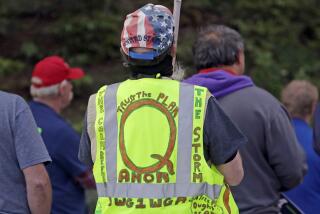In this high-plains town, an unlikely link to radical Islam
Reporting from Greeley, Colo. — For over 30 years, Peggy Ford Waldo has carefully catalogued the history of this high-plains town of lofty grain elevators and vast, pungent cattle pens.
She knows its major crops, its legacy of temperance and its deep religious roots. And she knows something else — Greeley’s strange connection to radical Islam.
As historian at the town museum, Waldo has become an unexpected expert on Sayyid Qutb, known as “Osama’s brain” and the chief ideologue behind the Muslim Brotherhood, which is now scrambling to secure a foothold in Egypt’s new government.
“I didn’t even know who he was until after 9/11,” Waldo said. “And then we began getting calls from around the world as his writings began to surface.”
Now the phone is ringing again.
In 1949, the dapper Egyptian spent six months as a graduate student at Colorado State College of Education in Greeley, now the University of Northern Colorado. His sojourn had a profound effect on his views of America; some even suggest that Greeley, once called “the city of churches,” gave birth to militant Islam.
“I don’t think the roots of radical Islam came from Greeley; they came from Qutb,” Waldo said. “They came from what he had internalized from his experience.”
A fastidious man who rarely missed the chance to take offense, Qutb complained bitterly about Greeley, a sedate town founded as a utopian colony in 1869. He groused about its spiritual emptiness, its racism, the brutality of football, the baseness of jazz and the mingling of the sexes.
“The American girl is well acquainted with her body’s seductive capacity,” he wrote in an article titled “The America I Have Seen.” “She knows seductiveness lies in the round breasts, the full buttocks and in the shapely thighs, sleek legs and she shows all this and does not hide it.”
He found the numerous churches mere facades.
“No one is more distant than the Americans from spirituality and piety,” he wrote. “Their thoughts, feelings and behavior could not be further from religion.”
Such talk still rankles in this farming community of 100,000, known for its strong conservative politics and even stronger aroma of cow dung drifting upon the wind.
“Certainly his perceptions were different from ours,” Mayor Tom Horton said. “I don’t think anyone associates the Muslim Brotherhood with Greeley.”
But Greeley’s impact can’t be ignored.
“I think Greeley did play a role in Qutb’s radicalization, but I also think he was inclined to be radicalized when he arrived,” said Lawrence Wright, author of the Pulitzer Prize-winning book “The Looming Tower: Al Qaeda and the Road to 9/11.” “Greeley was very much Middle America, but everything about it struck him the wrong way. He came with a chip on his shoulder, and Greeley gave him an excuse to build his case against America.”
Wright spent three days with Waldo researching her files.
He said Qutb is at the “peak” of fundamentalist thinkers, revered by Al Qaeda for embracing takfir, a kind of excommunication in which fellow Muslims are declared unbelievers so they can be killed.
Still, Qutb didn’t make much of an impression in Greeley. Waldo found a few photos but never met a local who knew him.
“Qutb was 43 at the time and may have been undergoing a midlife crisis,” she said. “He saw a lot of hypocrisy and materialism in America. He saw women in the workforce. America was looking forward, but he was looking backward to the glory days of Islam.”
After returning to Egypt, he published “Milestones,” a book that became a fundamentalist manifesto. He was arrested for anti-government activities and hanged in 1966.
As for Greeley, it’s a far different place these days. Muslims from Somalia have poured in to work at the JBS Swift & Co. meatpacking plant. In 2008, dozens walked out when they were refused prayer breaks. Qutb envisioned, even yearned for, such conflicts, but this one took a different turn.
“The managers felt prayers would hinder production, but we said it would only take 10 minutes and we would take turns,” said Asad Abdi, who heads the East Africa Community of Colorado, which helps resettle refugees. “They accepted our suggestion. We now have a permanent solution and live in peace.”
That’s the Greeley Waldo knows, not the Qutb caricature.
“Mark Twain said travel is fatal to prejudice, bigotry and narrow-mindedness,” she said. “Obviously, that wasn’t the case with Qutb.”
Kelly writes for The Times.
More to Read
Sign up for Essential California
The most important California stories and recommendations in your inbox every morning.
You may occasionally receive promotional content from the Los Angeles Times.










